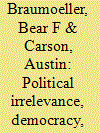| Srl | Item |
| 1 |
ID:
171219


|
|
|
|
|
| Summary/Abstract |
Post–civil war democracies are characterized by intense electoral competition. To ensure continued political relevance, ex-military-turned-politicians, or “warlord democrats” (WDs), can either engage in a rhetoric of fear or ease societal tensions by employing a rhetoric of peace. WDs’ choice of rhetoric can have a profound impact on durable peace by altering societal discourses concerning the legitimacy of using violence. A key question is therefore: Why do some WDs employ a rhetoric of fear, and others a rhetoric of peace, when running for office? We argue that the choice of rhetoric is a function of the patrimonial endowments WDs possess; if WDs lack the resources and social networks needed to distribute patronage, they may instead use a rhetoric of fear to rally voters. To highlight the explanatory value of this proposition, we compare two Liberian WDs who ran for the Senate in 2005—Adolphus Dolo and Prince Johnson.
|
|
|
|
|
|
|
|
|
|
|
|
|
|
|
|
| 2 |
ID:
104045


|
|
|
|
|
| Publication |
2011.
|
| Summary/Abstract |
Although the statistical literature on conflict studies has generated strong and consistent findings on the relationship of political irrelevance and dyadic democracy to conflict, scholars have paid scant attention to the interesting theoretical issue of how they matter. The authors argue that additive controls and dropping irrelevant dyads constitute misspecifications of their effects. There are theoretical reasons to believe that the impact of distance on conflict is not sufficiently severe to justify the practice of simply dropping irrelevant dyads. Moreover, they argue that political irrelevance and dyadic democracy, rather than subtracting some constant quantity, interact to impose an upper bound on the probability of conflict initiation. They find both of these arguments to be supported in a reanalysis of a prominent study of dispute initiation.
|
|
|
|
|
|
|
|
|
|
|
|
|
|
|
|
| 3 |
ID:
131658


|
|
|
| 4 |
ID:
153912


|
|
|
|
|
| Summary/Abstract |
Two broad positions—the “gap-bridgers” and the “gap-minders”—dominate the current debate on the (lack of) political relevance of International Relations (IR) theory. Missing from this debate, however, is a broader theoretical framework for contextualizing—and moving beyond—their disagreements. Hence, this article provides a theoretical account of the relationship between politics and knowledge. It shows that, in the modern context, scientific knowledge achieves political relevance by distancing itself—through theorizing—from the particularities of politics. This paradoxical relationship gives rise to three different dimensions of political relevance, which operate at different levels of abstraction. Metatheory plays a crucial role in constituting the modern conception of politics; theories establish concrete political spaces; and empirical studies can influence specific policies. Taking this context into account, moreover, calls for a reassessment of core features of the discipline: its supposed poverty, fragmentation, and immaturity are common features of all modern sciences; they function as a driver of scientific progress; and metatheoretical debates address the political dimension of the modern sciences. Hence, the source of IR’s political relevance lies in its theoretical foundations. Abandoning theory in favor of policy-oriented studies would simultaneously undermine the discipline’s policy relevance and its standing as a modern science.
|
|
|
|
|
|
|
|
|
|
|
|
|
|
|
|